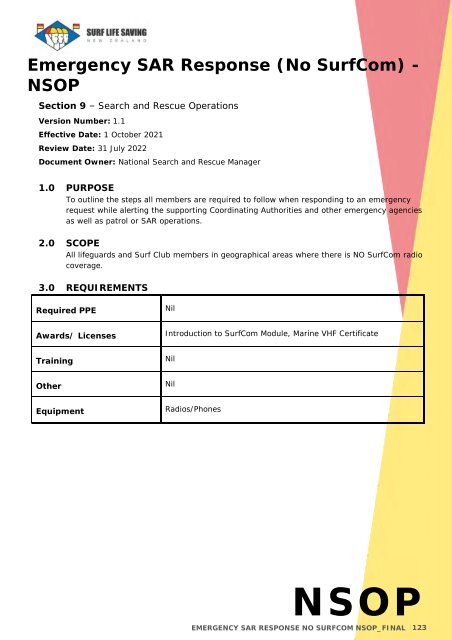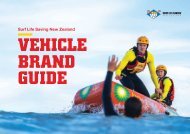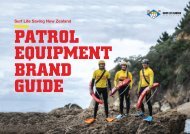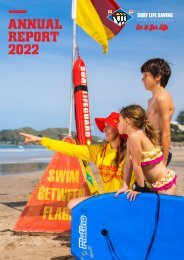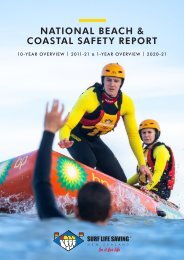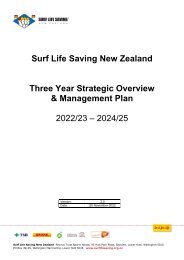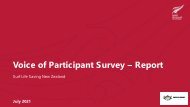National Standard Operating Procedures - Jul 2022
Full NSOP Manual
Full NSOP Manual
You also want an ePaper? Increase the reach of your titles
YUMPU automatically turns print PDFs into web optimized ePapers that Google loves.
C<br />
U<br />
Communicate<br />
Undertake<br />
Operation<br />
• Conduct team briefing (GSMEAC) before deploying.<br />
• Contact Coastguard/SurfCom/Police before launching.<br />
• Conduct radio checks before deployment and file trip report (TR) with<br />
Coastguard, stating:<br />
o Call sign<br />
o Number of persons on board<br />
o Intentions<br />
o Expected return time<br />
• Handover and liaise with other services using the ISBAR<br />
communication tool.<br />
• Communicate frequently throughout the incident.<br />
• Provide updates to SLSNZ staff when able.<br />
• Apply a Dynamic Risk Assessment (ORA) for each lifeguard or<br />
patrol support which considers whether they are mentally able, as<br />
well as physically able, enough to participate in a body recovery.<br />
• Ensure all team equipped with correct PPE for the task and<br />
environment.<br />
• Consider requesting a modified task or refusing the task if requested<br />
task exceeds team’s capabilities or safety concerns.<br />
• Document all details of the crew responding out to sea and pass to<br />
Police and SurfCom.<br />
• Request additional support if required early with Police (e.g., Coast<br />
Guard)<br />
• Conduct radio checks before deployment.<br />
• Develop a Comms plan by assigning call signs to each craft before<br />
deploying.<br />
• Conduct the recovery within limits of the team’s skill, experience and<br />
abilities.<br />
• Record operational details (times, places searched, etc.). NOTE: this<br />
record may be used as evidence.<br />
• Conduct recovery in conjunction with Police and other services.<br />
• File Situation Reports (SITREPS) frequently, especially when<br />
conditions change.<br />
• If you were not tasked to the recovery by Police, inform them of the<br />
incident immediately or as soon as practically possible.<br />
• Notify SurfCom or the relevant Duty Officer, staff member and SAR<br />
Squad if required.<br />
• Create a plan for carrying out the recovery including any other<br />
agencies present (e.g., Police), including assessment of the<br />
conditions, resources available and appropriate personnel to be<br />
involved.<br />
This plan may include:<br />
- declining to undertake the body recovery<br />
- if you do not have sufficient resources to undertake the<br />
recovery<br />
- experience to undertake the required task, or<br />
NSOP<br />
BODY RECOVERY NSOP_FINAL 116


